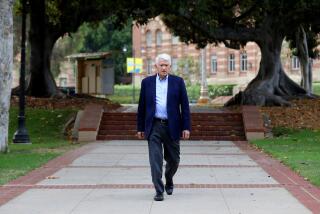Split Vote Over Leadership Reflects National Council of Churches’ Rift
LEXINGTON, Ky. — The difficulties plaguing the deeply divided National Council of Churches were played out in microcosm here earlier this week when the Council Governing Board split evenly on a recommendation to replace its chief staff official.
In a 57-57 vote with 13 abstentions, including the abstention of Council President Patricia McClurg, General Secretary Arie Brouwer narrowly survived an Executive Committee recommendation calling for “new leadership.”
Failure of the Governing Board to reach a clear decision on the matter of Brouwer’s leadership appears to reflect the much broader problem the Protestant-Anglican-Eastern Orthodox body has grappled with over the last half a dozen years: continuing divisions over how the organization should be structured, marked by an institutional inability to devise any clear solutions.
Lashed Out at Critics
Struggles over power and authority, and a strongly worded speech in which Brouwer lashed out at his critics, dominated the four-day meeting, which ended here Friday.
When the smoke had cleared, Brouwer was still standing at the helm of the nation’s pre-eminent ecumenical agency, leaving the 32-denomination council without a consensus on leadership.
However, Governing Board members had also approved a long-awaited plan of restructure that its framers hope will diminish some of the structural and financial problems that afflict the council.
During their semiannual meeting here, board members saw their work session turn tumultuous, riddled with charges, countercharges, recriminations and calls for repentance.
Sensitive Wounds
“Broken relationships” was a phrase heard on more than one occasion, and it was clear that the council’s health will depend on the healing of some very open and sensitive wounds.
The main business on the agenda was the restructure plan. But deliberations on that proposal came close to being derailed when Brouwer delivered a blistering 22-page speech Wednesday morning accusing his critics of being ready to destroy him and the council to satisfy their “will to power.”
For several years, Brouwer has been under fire by critics within the council who have charged him with an “authoritarian” management. He told board members that he decided to speak because the NCC is in need of “cleansing” and must face the truth if it is to surmount its difficulties.
‘Small Elite’
Brouwer suggested that the attacks on him were spearheaded by a “small elite of powerful denominational bureaucrats” who used him to vent their frustrations against the board.
Brouwer, who has headed the council since 1985 and is an ordained minister in the Reformed Church in America, charged, “For most of the last two years the ecumenical atmosphere has been fouled with rumors, innuendo and false charges.”
He pointed a finger at officials of Church World Service, the largest single agency unit, as pressing the attack. The widely respected relief agency has been at odds with Brouwer and the Governing Board primarily over the issue of how much funding it should contribute to support council-wide administrative activities.
Critical Assessment
In May, 1988, then-CWS Director J. Richard Butler resigned, charging that Brouwer’s style was authoritarian. Church World Service committee members sided with Butler at that time and issued a highly critical assessment of Brouwer.
Not long afterward, the Rev. William L. Wipfler, who headed the Division of Overseas Ministries’ Human Rights Office, resigned, citing similar reasons.
Brouwer’s speech here jolted both his supporters and critics. If there was any reason to rejoice, some delegates said, it lay in the fact that, at least, feelings were being discussed openly.
Yet, NCC President-elect Leonid Kishkovsky told members of the Governing Board that Executive Committee members were deeply divided over what action to take regarding Brouwer’s status.
‘Pain of All Was Evident’
“There was no great simplicity and ease in this discussion,” he reported. “The pain of all was evident, and the suffering of all was evident.” Kishkovsky said the board recognized the “skills, visions and talents” of Brouwer and the “integrity” of Brouwer’s report to the Governing Board.
However, he said, members of the Executive Committee “questioned the wisdom” of the general secretary’s remarks.
Ultimately, he said, the committee voted to follow the recommendation of the Committee of Fifteen--which designed the restructuring proposal--to take a “new look at leadership.”
United Methodist Bishop Melvin Talbert of San Francisco, who chaired the restructure committee, said the committee had received complaints about Brouwer’s leadership style in almost all of about 40 “consultations” the committee held when it crafted its proposal.
More to Read
Sign up for Essential California
The most important California stories and recommendations in your inbox every morning.
You may occasionally receive promotional content from the Los Angeles Times.









